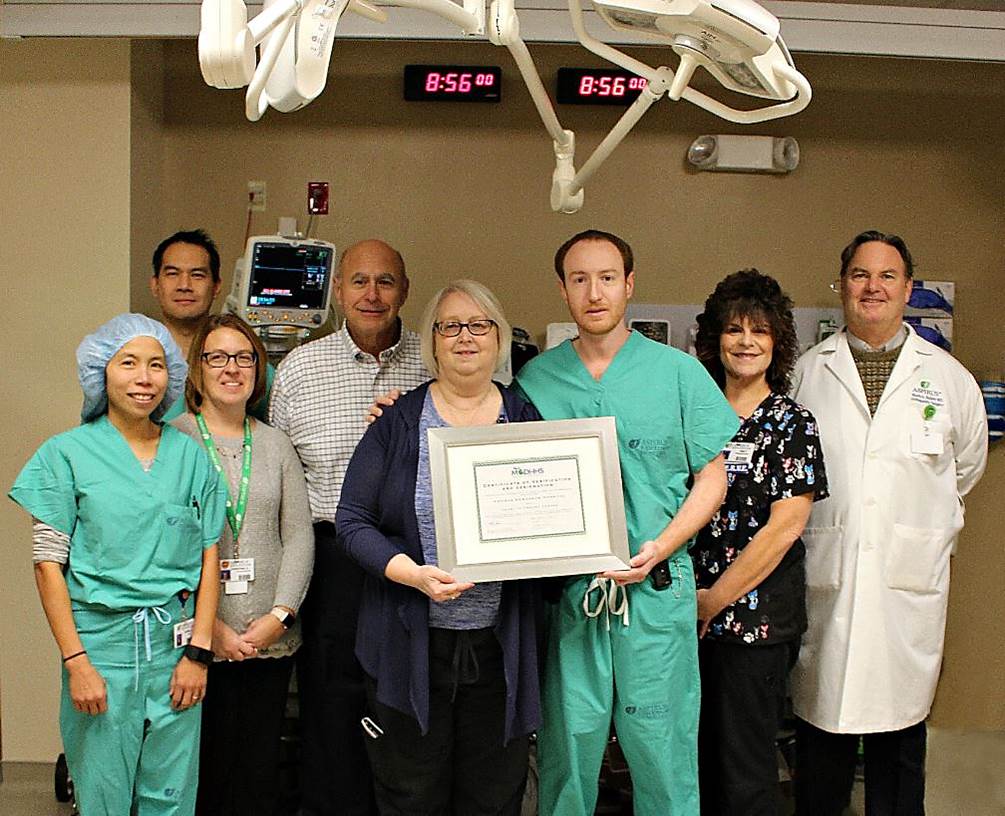
Pictured: Many providers, nurses and hospital staff were
involved in Aspirus Keweenaw Hospital achieving its Level III trauma
designation. Pictured from left to right are: Anesthesiologists Jasmin
David, CRNA and Francis Geronimo, CRNA; Laboratory Manager Christina Asiala;
Orthopedic Surgeon Frederick Rau, MD; Trauma Program
Coordinator Marlys Folly, RN; Trauma Medical Director and Chief of Surgery
Michael McAllister, DO; Diagnostic Imaging Manager Kim Pici; and
Orthopedic Surgeon Mark Kelley, MD, FACS.
In a trauma, every second counts. Whether its injuries sustained in a motor vehicle crash or from a same-level fall, Aspirus Keweenaw Hospital’s trauma team is ready 24-7 to respond with the highest levels of care for the best patient outcomes.
In early October, Aspirus Keweenaw Hospital received designation as a Level III Trauma Center by the Michigan Department of Health and Human Services (MDHHS). The state designation is a significant achievement and represents Aspirus Keweenaw’s commitment to providing advanced care for injured patients close to home.
Aspirus Keweenaw Trauma Program Coordinator Marlys Folly, RN, said key elements of a Level III Trauma Center include 24-hour immediate coverage by emergency medicine physicians and the prompt availability of general surgeons, orthopedic surgeons, anesthesiologists, diagnostic imaging and lab.
“A Level III Trauma Center demonstrates the ability to provide prompt assessment, resuscitation, stabilization of injured patients and high-quality emergency operations,” she said. “It’s about providing the right resources to the right patients as quickly as possible for the best outcomes.”
Achieving trauma designation from the MDHHS, involved implementing policies and procedures that enhance trauma care provided to injured patients. The hospital has added providers, emergency services, and additional training for staff to meet and exceed the Level III requirements. The designation is for a term of three years.
According to Folly, the most common trauma cases at Aspirus Keweenaw involve motor vehicle accidents, including motorcycles, pedal bikes, ATVs and snowmobiles, and same-level falls. In 2016, more than 50 percent of the traumas were same-level falls. For that reason, the trauma committee is in the process of developing community outreach and education programming focused on fall prevention and other injury prevention topics.
For a rural, critical access hospital trauma care is important for the health and safety of the community. Having an organized trauma care system in place is one of many ways Aspirus Keweenaw continues to invest in people, facilities, and technology to bring the highest levels of care close to home.
In 2015, the hospital underwent a major expansion and renovation. In addition to a new emergency department, new intensive care unit, and new hospital patient rooms, Aspirus added an expanded, state-of-the-art surgery center and outpatient lab. Since the project’s completion, Aspirus continues to see growth in emergency and trauma services and positive patient outcomes.
Mike Hauswirth, Chief Executive Officer for Aspirus Keweenaw, said the hospital’s trauma designation represents a significant and important step forward in their commitment to always serve patients with the best care.
“This designation recognizes that our quality, passion and compassion shine every day,” Hauswirth said. “Most importantly, it prepares us for the times when our patients need us the most.”